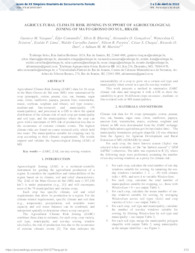Agricultural climate risk zoning in support of agroecological zoning of Mato Grosso do Sul, Brazil.
Agricultural climate risk zoning in support of agroecological zoning of Mato Grosso do Sul, Brazil.
Author(s): VASQUES, G. M.; COMUNELLO, E.; BHERING, S. B.; GONÇALVES, A. O.; TEIXEIRA, W. G.; LIMA, E. de P.; CARVALHO JUNIOR, W. de; PEREIRA, N. R.; CHAGAS, C. da S.; DART, R. de O.; MARTINS, A. M. M.
Summary: Agricultural Climate Risk Zoning (ZARC) data for 16 crops in the Mato Grosso do Sul state (MS) were summarized by crop (pineapple, cotton, peanut, rice, oat, banana, sugar cane, citrus, sunflower, papaya, passion fruit, watermelon, maize, soybean, sorghum and wheat), soil type (coarse-, medium-and fine-textured) and municipality (79 municipalities), and processed in a GIS to show the spatial distribution of the climate risk of each crop per municipality and soil type, and the municipalities where the crop can grow with a maximum of 40% risk of production loss due to the occurrence of extreme climatic events. The highest climate risks are found on coarse-textured soils, which hold less water. The municipalities suitable for cropping vary by crop according to their climatic requirements. The results support and validate the Agroecological Zoning (ZAE) of MS.
Publication year: 2023
Types of publication: Paper in annals and proceedings
Unit: Embrapa Soils
Observation
Some of Embrapa's publications are published as ePub files. To read them, use or download one of the following free software options to your computer or mobile device. Android: Google Play Books; IOS: iBooks; Windows and Linux: Calibre.
Access other publications
Access the Agricultural Research Database (BDPA) to consult Embrapa's full library collection and records.
Visit Embrapa Bookstore to purchase books and other publications sold by Embrapa.

